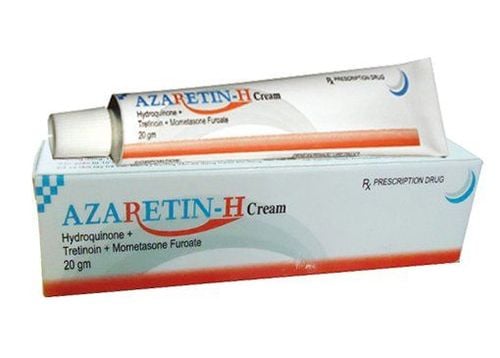This is an automatically translated article.
Hormonal disorder is a condition that occurs frequently in both sexes, more common in women than in men. This disorder usually occurs during puberty or perimenopause of women. Sometimes, for some medical reason, the disorder occurs even at the periods when the hormones in the body should be most stable.
1. Hormonal disorders
Manifestations of hormonal disorders:
In women:
Menstrual disorders: Endocrine disorders are the basic cause of menstrual problems in women. This disorder can be heavy menstrual bleeding, changes in the length of the menstrual cycle (prolonging or shortening the menstrual cycle), menstrual irregularities, menstrual pain that normally does not occur. Due to the effect on menstruation, if prolonged, it can become the cause of female infertility. Blood pressure fluctuations: Blood pressure in the body is directly affected by hormones in the body. When the endocrine system is out of balance, the amount of hormones is changed, especially aldosterone, which can lead to blood pressure problems, often hypertension. Decreased libido: Estrogen and progesterone are two important hormones involved in sexual pleasure in women. When the ratio of these hormones in the body is out of balance, it will lead to a decrease in sex drive and difficulty achieving orgasm during sex. There are skin problems: Endocrine disorders in women often cause a number of problems such as acne, melasma, freckles, age spots or hyperpigmentation.... Psychological changes: The People with endocrine disorders often tend to be more negative, irritable, hot-tempered, and moody. Frequent gynecological diseases due to an imbalance of hormones will make the vaginal wall unable to secrete mucus to lubricate and keep the vagina moist, thereby changing the vaginal pH, creating favorable conditions for fungi and bacteria. Bacteria grow and cause infections in the vagina. In men:
Similar to women, men with endocrine disorders will also show signs of fatigue, psychological changes, frequent stress and irritability. There are skin problems, mainly acne. In men, melasma and freckles are less visible than in women. Hairy. Decreased sex drive, premature ejaculation, erectile dysfunction, poor concentration,...

Rối loạn nội tiết là nguyên nhân cơ bản gây nên các vấn đề rối loạn kinh nguyệt ở nữ giới
2. How to treat hormonal disorders?
Treatment of hormonal disorders is a dilemma and requires perseverance.
2.1.Drug treatment When you start showing signs of a hormonal disorder, the first thing you need to do is visit your doctor for consultation, examination and treatment. Through tests, it is possible to accurately assess which hormone fluctuations are caused by, the enzymes and active ingredients involved, and at the same time, it is possible to determine the cause of endocrine disorders. from which to have appropriate treatment and hormone supplementation.
After being tested to determine the exact problem that is happening, depending on the condition of the cause and the level of the disorder to treat it in the direction of using drugs or not using drugs.
If necessary, the application of hormone replacement therapy will be indicated, which is usually the use of pharmacological hormones, which are synthesized from pharmaceutical chemical origin. Hormone replacement therapy is a method of using synthetic estrogen and progesterone into the body to help balance hormones.
In addition to hormone replacement therapy, in the treatment of hormonal disorders, it is necessary to use a combination of drugs such as:
Sedative Vitamins. Functional foods: Supplementing hormones derived from herbs and plants by using functional foods that support endocrine regulation derived from ginseng (especially peruvian ginseng) or virgin This method is currently being widely applied, bringing high efficiency and stability. However, most of the functional food lines are not special drugs, so they should not be used subjectively. 2.2.Treatment without drugs. Change the diet and activities, arrange working and resting time reasonably. Add foods rich in fatty acids such as omega 3, omega-6, omega-9 found in fish, sunflower seeds or avocados. These acids play an important role in the production of hormones in the body. Eat additional dark green vegetables such as cauliflower, cabbage... because it contains many vitamins (especially vitamins C, B) and minerals (magnesium, zinc, manganese, ...) directly involved in hormone production as well as hormone regulation in the body while inhibiting the possibility of endocrine disorders. Drink enough water, at least 2 liters/day. Create a healthy lifestyle:
Get enough sleep, work to limit stress and stress. Pressure and stress will cause the body to increase the production of cortisol, which negatively affects the body's endocrine system. It is possible to relax the body with light exercise, yoga, meditation, walking or hot bath... Can apply some gentle massage in the abdomen and foot massage to stimulate the conditioning process hormones in the body.

Thư giãn và tạo lối sống lành mạnh sẽ góp phần làm cân bằng nội tiết
Endocrine disorders are one of the serious problems that can affect the functioning of other organs, especially the endocrine glands such as the adrenal gland, thyroid gland and reproductive system functions. sex, which can lead to infertility and infertility.
Endocrine disorders need to be detected and treated early. Vinmec International General Hospital offers customers a package of basic gynecological examination and screening to help women proactively check their physiological health, screen for disease risk and have scientific treatment.
Please dial HOTLINE for more information or register for an appointment HERE. Download MyVinmec app to make appointments faster and to manage your bookings easily.













